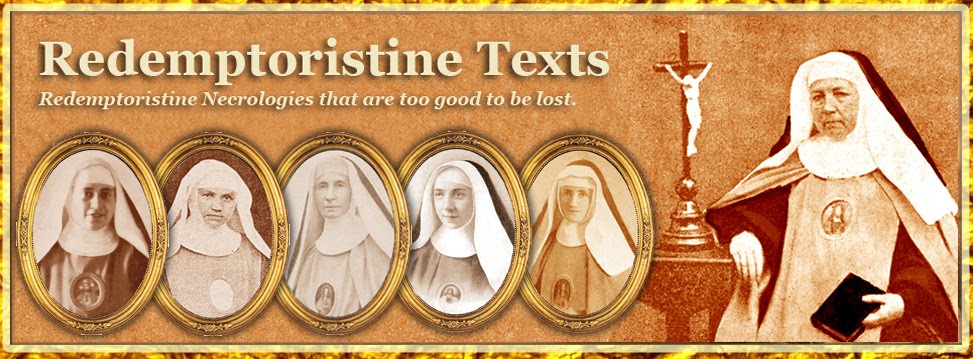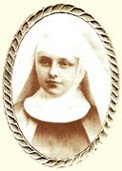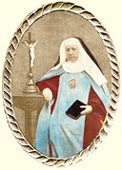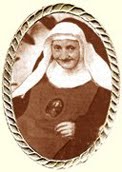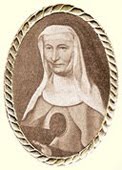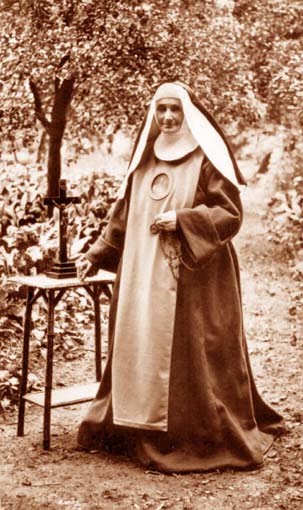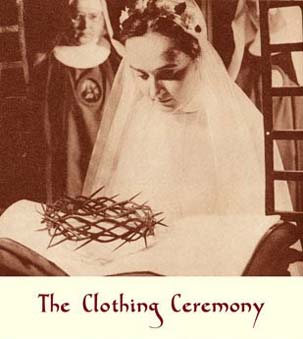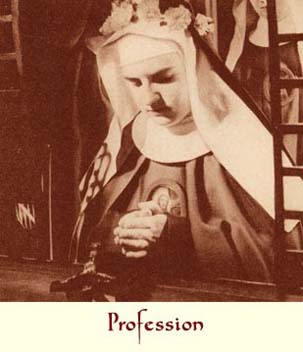Foundress of the Convent of the Redemptoristines of Velp, near Grave, founded in 1858
Chapter VIII. A Jubilee.
Last years of Mother Marie Cherubine – Her virtues
Mother Marie Cherubine, thanks to her devotion, her abilities, her tact in the direction of souls and her pleasant manner, was thus venerated and cherished by her Sisters and the people who surrounded her - in a word, by her daughters and all those who knew her. So it is not astonishing that she was re-elected several times on the unanimity of the voices as the Superior of the community.
This is how she always remained at the head of this community that she herself had brought from Bruges, and to which she had consecrated all her cares, her life, her strength and her talents. And so she was venerated and cherished as a mother, in the full sense of the term. Everyone experienced the effects of her maternal charity and solicitude. No Sister was an exception, and this is why everyone, absolutely everyone, loved her with all the tenderness a child has for its mother. They were able to show this to her especially clearly in a solemn circumstance. Let us borrow the account of the good mother’s Jubilee from the Monastery Chronicle.
“20th July 1883. We in the community will never forget this memorable date, and it will always be happily remembered. It was the 25th anniversary of the foundation of this convent, and also the 25th anniversary of the Superiority of the Reverend Mother Cherubine, our foundress. Through the medium of Father Nicholas Mauron, the Superior General of the Redemptorist Fathers, His Holiness Leo XIII granted a plenary indulgence to every faithful who took Holy Communion in our chapel and prayed for the intentions of the Sovereign Pontiff, otherwise, 300 days of indulgence, on each day of the octave, for those who came to pray in our chapel.
“Through the efforts of Rev. Father Justin, Capuchin, who for twelve years had been the Sisters’ confessor, the chapel was decorated tastefully by means of draperies, standards and placards on which sentences were written, etc.
“The Reverend Mother prepared herself for the solemnity by a retreat of several days, and the religious had the opportunity to prepare and decorate the convent the best way possible. As a witness to the esteem they had for the Jubilarian, some precious gifts were offered for the chapel and the house.
“At 8 o’clock, there was a solemn Mass with three priests. The sermon was given by Rev. Father Athanase, Capuchin. Twenty-five years beforehand, His Reverence had assisted at the foundation of the Monastery. The preacher reminded his listeners about everything that had been done concerning the establishment, with the grace of God, during these long years, and through the devoted care of good Mother Marie Cherubine.
“After the Mass, the Reverend Mother, accompanied by the founding Sisters, five Choir Sisters and two converse, was conducted solemnly to the recreation room, to the chant of the Benedictus. Everything there was decorated magnificently. The Sisters were welcomed there with many chants and compliments. This day was truly a day of thanksgiving and joy for us, and will remain forever engraved upon our memories. Our Mother also received the signs of their cordial participation in the feast from her family and her acquaintances from outside. On this occasion, the good Mother also received a letter from the hand of Cardinal Deschamps, and many letters of congratulation came from elsewhere, including from the other convents of the Congregation established in Holland and in other places.”
The thoughts running through Mother Marie Cherubine’s mind in these circumstances are well described in this extract from a letter addressed by her to one of her former spiritual daughters, and now (1883) the Superior of another community of the same Congregation.
“Here,” she told her, “everything at this moment is topsy-turvy. It is a mysterious time when I must remain in my cell. The double jubilee, that of the foundation and that (alas!) of the Superior, requires it, they tell me. I beg you, my good Mother, intervene here in my favour, and show me your filial affection in imploring for me the great mercy of the best of Fathers. Pray also that in future, all the moments of my life will be consecrated to this one thing that alone is important: my sanctification. I also await from your community a prayer for myself and for this dear house…”
So therefore this double jubilee was a magnificent and memorable feast. It could not have been otherwise, and the bonds that united the children to this excellent Superior and this charitable Mother, became even closer.
Mother Marie Cherubine, in spite of her age, continued to watch zealously over the exact observance of the Rule, and herself to progress in the way of perfection. Being everything to everyone and leading all her subordinates to God, this was her only purpose and the motive behind all her works and all her sacrifices. “None of the Sisters who were under her wise direction,” one of her daughters tells us, “could ever forget the tenderness with which she elevated our hearts to God, and the affectionate zeal with which she knew how to encourage those who were afflicted with sufferings, not just spiritual, but also corporal. Then she would lift up their courage with her thoughts of faith and generosity. She was careful to direct them all following God’s wishes and the character of each one of them in particular. She granted her daughters everything she could in order to help them in the practice of virtue and make them correspond to their vocation. As a true disciple of Saint Alphonsus, she also wanted a continual prayer to be in the hearts and on the lips of everyone who was under her direction.”
Prayer - this is a characteristic of the spiritual life. All the time she could dispose of, she consecrated to prayer. This was the life of her soul, and no pretext was capable of making her neglect this holy exercise.
To her esteem of prayer she joined her love of the word of God, Holy Scripture, which for her was always an abundant spring, where she would go to quench the thirst of her soul. It mattered little to her by whose mouth it was communicated to her. Sometimes it happened that the community was not too satisfied by one or another preacher. As for her, she was always content. It was always enough for her to hear God spoken of. Just the name of God offered her a subject sufficient for meditation.
Her life was also a life of mortification. Even when she had reached an advanced age and was bent over because of her sufferings and her fatigue, she could be heard every evening beating her poor old body with blows of the discipline. Feeble as she was, she could no longer eat the common food, and yet even on this point she would try to mortify herself. If one of the Sisters should bring her some special food, which her filial love had led her to prepare with a great deal of care, the good Superior, to mortify herself, would put it adroitly to one side, and when the Sisters were assembled in the chapel to recite the Office, she would call one of the converse Sisters and give it to her, convinced that this food would be more useful to her than to herself.
The religious who looked after her in her last illness has told us something that proves her truly maternal love for her children. Sometimes her fever was so severe that she fell into a delirium. One evening when she was being devoured by an ardent fever, she imagined that the bell was calling the Sisters to the Office in choir. She immediately got up and tried to get dressed: “It is time to go to Office,” she cried. “I must be there, let me go.” The Sister infirmarian did not know how to calm her, when the thought came to her to tell her: “My Mother, oh, be good enough to listen to me for a moment. I have a pain which is tormenting me greatly.” At that moment, to the great astonishment of the Sister, the good Mother recovered her habitual tenderness and asked her in a tone of profound compassion what was troubling her. Then, as if she had recovered her senses, she spoke to her with so much tenderness and told her such consoling words that the memory of them has never been effaced from the Sister’s memory. So great was her charity for her daughters and for her neighbour!
As her feebleness always kept on increasing with the number of her years, she more than once expressed the desire to see herself discharged of the burden of her Superiority. We have found one of her letters on this point that she addressed to the Superior of another community.
“Pray,” she told her, “pray for me and for our dear Community, as I hope that in the month of October 1882, I shall be discharged from my burden. I have borne it for a very long time for the love of the will of God. This is why I often tell my former Sisters that they should choose the Mother Vicar as their Superior. There is much to recommend her. She is prudent and intelligent. But she is opposed, on the pretext of the feebleness of her health. I do not dare to speak to her any more about it myself. The thought of it alone would make her ill. So let us pray together for this affair to have a happy outcome.”
Mother Marie Cherubine was nonetheless elected once again. She had to submit to the will of the community, which was happy to be under her wise and prudent direction. So she accepted the burden of the Superiority again that God had imposed on her, as she sought in everything and above everything, His divine will. And she carried this yoke that was so heavy for her in submission until her death, that is to say, for the space of twenty nine years.
Beginning in 1884, the good Mother’s health became feeble in a remarkable manner, and they had to make her take the necessary rest. But it was so painful for her not to be able to follow the community acts that she was in a hurry to get back to them. In this way too she was a model of strict observance to the holy Rule.
One day, as a result of her advanced age, (she was seventy years old), she had the misfortune of falling down while she was climbing the stairs, and she dislocated her shoulder. Not a single complaint came from her lips, nothing betrayed her internal suffering, and nothing could make her lose her calm and her habitual meekness. This was fresh proof of her high degree of perfection and her complete abandonment to the holy will of God.
Little by little her strength diminished to the point where, at the beginning of the year 1887, she gave the early signs that her end was more or less near. Mother Marie Cherubine was then about seventy five. The time had come for her to receive the rewards of her pains, cares and virtues.
But God wanted to purify her soul even further in the crucible of suffering. Having thus found the treasure of the pure gold of charity, she could now be united more intimately with Him for whom she alone had searched while on earth, and to whom for so many long years she had consecrated her heart and her whole life. Nothing now attached her to the world, and with the royal Chanter she could say: “As the thirsty hart sighs after the spring of living water, so my heart desires You, O my God.” (Ps. 41:2).
For a few more months yet, Mother Cherubine would have to endure great sufferings, and for a few more months yet, her daughters were able to contemplate the admirable examples of their worthy and much-beloved Superior, and then they became the witnesses of this death of which Holy Scripture speaks when it says that it is precious in the eyes of the Lord.
This is how she always remained at the head of this community that she herself had brought from Bruges, and to which she had consecrated all her cares, her life, her strength and her talents. And so she was venerated and cherished as a mother, in the full sense of the term. Everyone experienced the effects of her maternal charity and solicitude. No Sister was an exception, and this is why everyone, absolutely everyone, loved her with all the tenderness a child has for its mother. They were able to show this to her especially clearly in a solemn circumstance. Let us borrow the account of the good mother’s Jubilee from the Monastery Chronicle.
“20th July 1883. We in the community will never forget this memorable date, and it will always be happily remembered. It was the 25th anniversary of the foundation of this convent, and also the 25th anniversary of the Superiority of the Reverend Mother Cherubine, our foundress. Through the medium of Father Nicholas Mauron, the Superior General of the Redemptorist Fathers, His Holiness Leo XIII granted a plenary indulgence to every faithful who took Holy Communion in our chapel and prayed for the intentions of the Sovereign Pontiff, otherwise, 300 days of indulgence, on each day of the octave, for those who came to pray in our chapel.
“Through the efforts of Rev. Father Justin, Capuchin, who for twelve years had been the Sisters’ confessor, the chapel was decorated tastefully by means of draperies, standards and placards on which sentences were written, etc.
“The Reverend Mother prepared herself for the solemnity by a retreat of several days, and the religious had the opportunity to prepare and decorate the convent the best way possible. As a witness to the esteem they had for the Jubilarian, some precious gifts were offered for the chapel and the house.
“At 8 o’clock, there was a solemn Mass with three priests. The sermon was given by Rev. Father Athanase, Capuchin. Twenty-five years beforehand, His Reverence had assisted at the foundation of the Monastery. The preacher reminded his listeners about everything that had been done concerning the establishment, with the grace of God, during these long years, and through the devoted care of good Mother Marie Cherubine.
“After the Mass, the Reverend Mother, accompanied by the founding Sisters, five Choir Sisters and two converse, was conducted solemnly to the recreation room, to the chant of the Benedictus. Everything there was decorated magnificently. The Sisters were welcomed there with many chants and compliments. This day was truly a day of thanksgiving and joy for us, and will remain forever engraved upon our memories. Our Mother also received the signs of their cordial participation in the feast from her family and her acquaintances from outside. On this occasion, the good Mother also received a letter from the hand of Cardinal Deschamps, and many letters of congratulation came from elsewhere, including from the other convents of the Congregation established in Holland and in other places.”
The thoughts running through Mother Marie Cherubine’s mind in these circumstances are well described in this extract from a letter addressed by her to one of her former spiritual daughters, and now (1883) the Superior of another community of the same Congregation.
“Here,” she told her, “everything at this moment is topsy-turvy. It is a mysterious time when I must remain in my cell. The double jubilee, that of the foundation and that (alas!) of the Superior, requires it, they tell me. I beg you, my good Mother, intervene here in my favour, and show me your filial affection in imploring for me the great mercy of the best of Fathers. Pray also that in future, all the moments of my life will be consecrated to this one thing that alone is important: my sanctification. I also await from your community a prayer for myself and for this dear house…”
So therefore this double jubilee was a magnificent and memorable feast. It could not have been otherwise, and the bonds that united the children to this excellent Superior and this charitable Mother, became even closer.
Mother Marie Cherubine, in spite of her age, continued to watch zealously over the exact observance of the Rule, and herself to progress in the way of perfection. Being everything to everyone and leading all her subordinates to God, this was her only purpose and the motive behind all her works and all her sacrifices. “None of the Sisters who were under her wise direction,” one of her daughters tells us, “could ever forget the tenderness with which she elevated our hearts to God, and the affectionate zeal with which she knew how to encourage those who were afflicted with sufferings, not just spiritual, but also corporal. Then she would lift up their courage with her thoughts of faith and generosity. She was careful to direct them all following God’s wishes and the character of each one of them in particular. She granted her daughters everything she could in order to help them in the practice of virtue and make them correspond to their vocation. As a true disciple of Saint Alphonsus, she also wanted a continual prayer to be in the hearts and on the lips of everyone who was under her direction.”
Prayer - this is a characteristic of the spiritual life. All the time she could dispose of, she consecrated to prayer. This was the life of her soul, and no pretext was capable of making her neglect this holy exercise.
To her esteem of prayer she joined her love of the word of God, Holy Scripture, which for her was always an abundant spring, where she would go to quench the thirst of her soul. It mattered little to her by whose mouth it was communicated to her. Sometimes it happened that the community was not too satisfied by one or another preacher. As for her, she was always content. It was always enough for her to hear God spoken of. Just the name of God offered her a subject sufficient for meditation.
Her life was also a life of mortification. Even when she had reached an advanced age and was bent over because of her sufferings and her fatigue, she could be heard every evening beating her poor old body with blows of the discipline. Feeble as she was, she could no longer eat the common food, and yet even on this point she would try to mortify herself. If one of the Sisters should bring her some special food, which her filial love had led her to prepare with a great deal of care, the good Superior, to mortify herself, would put it adroitly to one side, and when the Sisters were assembled in the chapel to recite the Office, she would call one of the converse Sisters and give it to her, convinced that this food would be more useful to her than to herself.
The religious who looked after her in her last illness has told us something that proves her truly maternal love for her children. Sometimes her fever was so severe that she fell into a delirium. One evening when she was being devoured by an ardent fever, she imagined that the bell was calling the Sisters to the Office in choir. She immediately got up and tried to get dressed: “It is time to go to Office,” she cried. “I must be there, let me go.” The Sister infirmarian did not know how to calm her, when the thought came to her to tell her: “My Mother, oh, be good enough to listen to me for a moment. I have a pain which is tormenting me greatly.” At that moment, to the great astonishment of the Sister, the good Mother recovered her habitual tenderness and asked her in a tone of profound compassion what was troubling her. Then, as if she had recovered her senses, she spoke to her with so much tenderness and told her such consoling words that the memory of them has never been effaced from the Sister’s memory. So great was her charity for her daughters and for her neighbour!
As her feebleness always kept on increasing with the number of her years, she more than once expressed the desire to see herself discharged of the burden of her Superiority. We have found one of her letters on this point that she addressed to the Superior of another community.
“Pray,” she told her, “pray for me and for our dear Community, as I hope that in the month of October 1882, I shall be discharged from my burden. I have borne it for a very long time for the love of the will of God. This is why I often tell my former Sisters that they should choose the Mother Vicar as their Superior. There is much to recommend her. She is prudent and intelligent. But she is opposed, on the pretext of the feebleness of her health. I do not dare to speak to her any more about it myself. The thought of it alone would make her ill. So let us pray together for this affair to have a happy outcome.”
Mother Marie Cherubine was nonetheless elected once again. She had to submit to the will of the community, which was happy to be under her wise and prudent direction. So she accepted the burden of the Superiority again that God had imposed on her, as she sought in everything and above everything, His divine will. And she carried this yoke that was so heavy for her in submission until her death, that is to say, for the space of twenty nine years.
Beginning in 1884, the good Mother’s health became feeble in a remarkable manner, and they had to make her take the necessary rest. But it was so painful for her not to be able to follow the community acts that she was in a hurry to get back to them. In this way too she was a model of strict observance to the holy Rule.
One day, as a result of her advanced age, (she was seventy years old), she had the misfortune of falling down while she was climbing the stairs, and she dislocated her shoulder. Not a single complaint came from her lips, nothing betrayed her internal suffering, and nothing could make her lose her calm and her habitual meekness. This was fresh proof of her high degree of perfection and her complete abandonment to the holy will of God.
Little by little her strength diminished to the point where, at the beginning of the year 1887, she gave the early signs that her end was more or less near. Mother Marie Cherubine was then about seventy five. The time had come for her to receive the rewards of her pains, cares and virtues.
But God wanted to purify her soul even further in the crucible of suffering. Having thus found the treasure of the pure gold of charity, she could now be united more intimately with Him for whom she alone had searched while on earth, and to whom for so many long years she had consecrated her heart and her whole life. Nothing now attached her to the world, and with the royal Chanter she could say: “As the thirsty hart sighs after the spring of living water, so my heart desires You, O my God.” (Ps. 41:2).
For a few more months yet, Mother Cherubine would have to endure great sufferings, and for a few more months yet, her daughters were able to contemplate the admirable examples of their worthy and much-beloved Superior, and then they became the witnesses of this death of which Holy Scripture speaks when it says that it is precious in the eyes of the Lord.
This necrology is translated from Fleurs de l'Institut des Rédemptoristines by Mr John R. Bradbury. The copyright of this translation is the property of the Redemptoristine Nuns of Maitland, Australia. The integral version of the translated book will be posted here as the necrologies appear.
